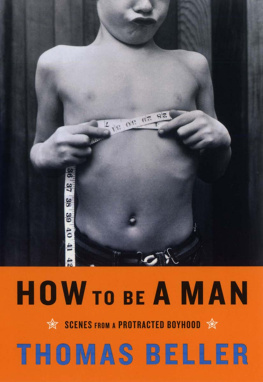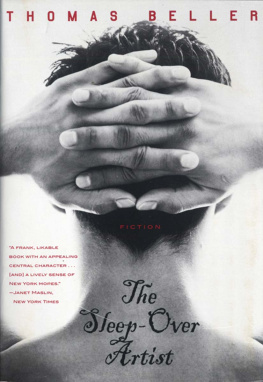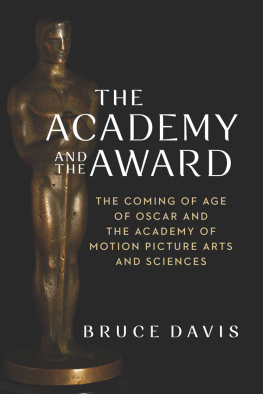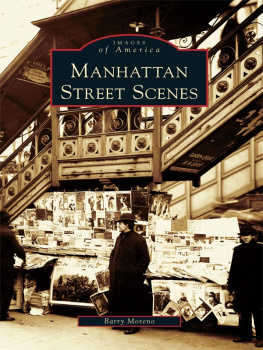HOW TO BE A MAN
Scenes from a Protracted Boyhood
THOMAS BELLER
W. W. NORTON & COMPANY
NEW YORK LONDON
Some of the essays in this book have previously appeared, usually in a different form, in the following publications: Manhattan Ate My Car in Slate , The Costume Party in Vogue , Mother Goes to Hollywood in The New Yorker , Chemistry Set in Cabinet, The Drummer in The New Yorker , The Birthday Suit in the New York Times Magazine , Portrait of the Bagel as a Young Man in Personals and the Anchor Essay Annual, 1999 , The Problem with T-shirts in The New Yorker , A Biker in the City in The New Yorker , Turtles in New York in the New York Press , The Breakup in Elle , The Tryout in the New York Times Sunday Sports section, Addicted to Love in Elle , The Last Days of Shakespeare & Company in the New York Observer , Strip Club in Mens Health , A Car Is Not a Castle in Best Life , Scenes from a Playground, A Bike Messenger in the City, and The Floating Armoire in the New York Times City section, and Walking the Dog in the Southwest Review .
Copyright 2005 by Thomas Beller
All rights reserved
For information about permission to reproduce selections from this book, write to Permissions, W. W. Norton & Company, Inc., 500 Fifth Avenue, New York, NY 10110
Library of Congress Cataloging-in-Publication Data
Beller, Thomas.
How to be a man: scenes from a protracted boyhood / Thomas Beller.1st ed.
p. cm.
ISBN: 978-0-393-33914-7
1. Beller, Thomas. 2. Beller, ThomasChildhood and youth. 3. Authors, American20th centuryBiography. I. Title.
PS3552.E53364Z466 2005
813'.54dc22 2005015095
W. W. Norton & Company, Inc.
500 Fifth Avenue, New York, N.Y. 10110
www.wwnorton.com
W. W. Norton & Company Ltd.
Castle House, 75/76 Wells Street, London W1T 3QT
TO THE LATE
WRITER AND PROFESSOR JEROME BADANES
RISK-TAKER, ADVENTURER OF LITERATURE,
THE SOUL,
AND THE CITY,
WHO MADE THE WORD
COFFEE
SEEM LIKE A EUPHEMISM FOR ALL THAT WAS CIVILIZED AND GOOD
AND UNDER WHOSE TUTELAGE AND WITH WHOSE
FRIENDSHIP THE FIRST PENNY-DROP MOMENT OF WRITERLY AMBITION
AND EXCITEMENT WAS EXPERIENCED BY THIS WRITER,
MY ADMIRATION AND GRATITUDE FOR
THE CONTINUED SUSTENANCE OF MEMORY,
THIS BOOK
IS DEDICATED.
And what about all the good I have in my heartdoesnt it mean anything? Is it simply a joke? A false hope that makes a man feel the illusion of his worth? And so he goes on with his struggles. But this good is no phoney.
SAUL BELLOW
CONTENTS
MANHATTAN ATE MY CAR
35 years old
A LITTLE WHILE AGO I WENT TO GET MY CAR AND found that it was not where I had left it. The car is, or was, a huge, mint-green 1977 Thunderbird; almost half of the cars considerable length was taken up by the hood, which gave it the vague air of a yacht. People often responded to it with almost visceral expressions of pleasure, such as the old man who ambled up to it at a gas station and said, Now, thats some material! Thats a car! You could build three cars these days with the material on that car!
He said all this not so much to me as to the car itself, as though the sight of it had immediately brought him back to his former 1977 self, with whom he was now striking up a conversation.
The cars condition was, from my point of view, perfect, which is to say it was perfectly poised somewhere between being a rusted-out piece of junk and one of those mint-condition vintage numbers that, Im sure, look great cruising their native suburban roads, but always seem decadent and a bit silly on the streets of Manhattan. The cars early life had been spent in Los Angeles, and the paint job was seriously sun-faded, giving it a slightly stoned, acid-washed appearance, and creating a shade of green that was, to put it charitably, unique. Its great advantage was that it was a car I could feel very proud of, but at the same time it was simply not a car that anyone would bother to steal. Or so I had thought.
I had left it on a dusty and out-of-the-way stretch of road across from the UPS depot near the Hudson River, where alternate-side-of-the-street parking regulations do not apply. Now it was gone, but the cars enormity and peculiarity made it very hard to grasp its absence, while at the same time making its absence all the more glaring. A pedestrian happened to be walking down the street, and I could barely resist turning to him and saying, Excuse me, but did you see a giant green car rolling down the street? or something like that. I stared at the spot where I had parked the car a week or so earlier. It was now occupied by another car. I looked away. I looked back. It was still not there. I was on my bikeyes, I biked to my car, such is car ownership in no-garaged Manhattanand eventually, though my mind could not fully grasp this new absence, I realized I couldnt keep standing there. I went home.
My girlfriend, with whom I was to be taking a weekend trip, was napping. This was a great relief. I wanted some private time to deal with this unexpected turn of events. I made various phone calls to various city agencies in the hopes that it had been towed. It had not.
Then I biked back to the spot where I had last seen my car. How irrational we are in the face of bad news! The car was not there. I had elaborate weekend plans, was meant to be picking some other people up, and so I got on the cell phone and began working on contingency schemes, which resulted in my getting a friends car, which was located in a nearby garage. It was an Audi. Actually, it was a deceased friends Audi. The last time I had been in it he had been driving. We had been on the way to his wedding.
I got the Audi, I drove here, I drove there, we went to the country, and the whole time, as I readjusted my posture to the Audis bucket seat (as opposed to the living room couch provided by the Thunderbird) and got the feel of the car, I vacillated between feeling grief-stricken at the loss of my car and feeling really grief-stricken at the far larger loss of my friend whose car I was now driving. Then I chastised myself for grieving about the car at all. What do you call it when your car is stolen? A bummer?
I didnt call it anything. I got back to New York at the end of the weekend, returned the Audi, biked past the spot where I had last seen my car (still not there), and proceeded to do absolutely nothing about it. What I specifically didnt do was call the police. I told a few people who had driven in the car about it, and felt consoled by their genuine dismay that it was gone. But the days turned to weeks and still I didnt call the police. I should say here a little about the cars background in my life. I had purchased it two years earlier. It was, more or less, my first car. The purpose of getting it was to take a massive cross-country driving trip. The logic of buying a 1977 Thunderbird for a massive cross-country driving trip is, obviously, questionable, as its not exactly an economy car in terms of mileage and, furthermore, anything that old is prone to break down, but I bought the thing in the spirit of extravagance and illogic, on a lark, for fun and adventure, and as there was nothing particularly prudent or wise or rational in my decision to buy a carone certainly doesnt need one in ManhattanI merrily abandoned those principles when choosing which car to buy.
The car proceeded, within days of my setting off on the trip, to break down (in the middle of the night, in the middle of nowhere) and required massive engine work that in one stroke doubled the $1,000 price tag I had paid. After that it raced through eight thousand miles of American landscape in stellar form, including scaling the Rockies and an absurdly steep mountain road in Glacier National Park, though for the entire trip I was in a state of paranoia, desperately listening for that death rattle that would signify another breakdown.














